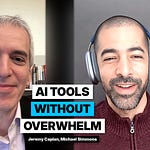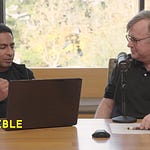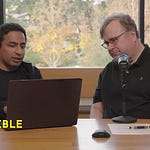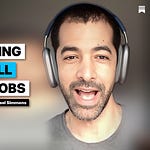Transform Every AI Interaction Into a Growth Opportunity
What if every conversation with AI could fundamentally rewire how you learn and think? In this session on recursive self-improvement, Anand Rao and I explored how to move beyond using AI as a simple answer machine to creating an AI-human learning loop that accelerates your evolution.
While most people risk having AI diminish their cognitive abilities (like GPS weakened our sense of direction), we shared a super high-leverage prompt that systematically expands your mental capacity instead.
The core takeaway:
Every interaction with AI is literally rewiring your brain.
We can very easily change every AI interaction by changing the system prompt. The symptom prompt is the instructions that ChatGPT and Claude reference before EVERY interaction.
We shared a transformative symptom prompt designed to maximize developmental growth.
What We Covered During the Class
Explored historical parallels between AI and writing's impact on memory
Discovered OpenAI's new study mode for educational interactions
Created personalized learning partnerships rather than simple question-answer exchanges
Designed system prompts that turn every AI conversation into learning
Analyzed voice development through Bonnie Johnston's 17-element prompt chain framework
Examined nervous system regulation for approaching avoided learning areas
Built recursive improvement prompts with growth mirrors and blind spot identification
Practiced perspective-taking exercises using hybrid vigor from multiple viewpoints
Explored mental complexity gaps between current and optimal thinking structures
Connected learning acceleration to richer life experiences and extended time perception
The implications extend far beyond productivity. As Anand shared, continuous learning literally expands your subjective experience of time and creates a richer, more fulfilling life. When you're constantly making new distinctions and growing, your brain creates more "moments"—making your life feel both longer and more meaningful.
AI-Generated Podcast Summary Of The Class
RECORDING RESOURCES
Classes In The Human Superintelligence Track
Prompts Mentioned In Class
Presentation Slides
Class Transcript
Resources Shared
AI Timestamps
AI Chapter Summaries
Chat Transcript
Watch Other Classes In The Human Superintelligence Track
Prompts Mentioned In Class
Presentation Slides
Class Transcript
Resources Shared
Shared by Michael
Shared by Students In Chat
AI Timestamps
Introduction and Bonnie's 17-Element Voice Analysis (00:00:00 - 00:07:12)
Discussion on Human Experience vs AI and Class Introduction (00:07:12 - 00:16:02)
OpenAI Study Mode Demo and System Prompts (00:16:02 - 00:28:15)
Anand Joins - Personal Growth Through AI Learning (00:28:15 - 00:46:05)
Overcoming Learning Plateaus and Nervous System Regulation (00:46:05 - 00:58:28)
Recursive Self-Improvement Prompt Explanation (00:58:28 - 01:14:45)
Testing the Prompt and Initial Reactions (01:14:45 - 01:16:54)
Vision for Unconscious Learning Competence and Life Enrichment (01:16:54 - 01:26:45)
AI Chapter Summaries
Introduction and Bonnie's 17-Element Voice Analysis (00:00:00 - 00:07:12)
The class begins with Michael welcoming everyone and highlighting Bonnie's impressive work on a 17-element prompt chain for analyzing writer's voice in fiction. Bonnie explains how she developed this comprehensive system over 10+ years of professional editing, investing over 1,000 hours to identify the distinct elements that make writers unique. She's creating an app to make this complex process accessible to her non-AI-savvy students, allowing them to upload manuscript chapters and work through the analysis systematically. The discussion reveals how this tool bridges the gap between expert knowledge and practical application, transforming an unwieldy process into something engaging for writers afraid of AI prompting.
Discussion on Human Experience vs AI and Class Introduction (00:07:12 - 00:16:02)
Faith raises a crucial question about whether going directly to AI for analysis might cause us to lose the richness of human experience and the friction that creates expertise. Bonnie acknowledges this concern, referencing an article about how entry-level jobs create essential friction and feedback that develops expert judgment. She explains the difference between having AI generate a checklist versus developing the muscle memory and intuitive skills that come from years of practice. Michael uses this as a segue into the class topic, introducing the concept that every AI interaction risks rewiring our brains and the importance of using AI not just for automation but for growth. He and co-teacher Anand are exploring how to make each AI interaction a learning opportunity.
OpenAI Study Mode Demo and System Prompts (00:16:02 - 00:28:15)
Michael introduces the historical context of skill loss, comparing current concerns about AI to past changes like GPS affecting navigation skills and calculators impacting math abilities. He references Plato's Phaedrus and Socrates' concerns about writing externalizing memory, drawing parallels to how AI externalizes thinking. The session introduces OpenAI's new Study Mode as an example of AI designed for learning rather than just answering questions. Participants are given time to explore the tool and consider how to customize their own system prompts. The discussion includes suggestions like asking for counterintuitive perspectives, next steps for clarity, and creating collaborative rather than transactional interactions with AI. The emphasis is on turning every AI interaction into a growth opportunity through thoughtful system prompt design.
Anand Joins - Personal Growth Through AI Learning (00:28:15 - 00:46:05)
Anand joins the discussion, sharing insights about AI's bias toward being overly agreeable and the importance of requesting more objective, challenging responses. Michael shares his personal breakthrough using AI to learn make.com, where having prompts that identified his blind spots and taught fundamental concepts helped him overcome previous learning plateaus. This leads to a broader discussion about revisiting areas of learning we've previously abandoned. Participants share examples like piano, coding, music, and various skills they'd written off but might now approach differently with AI assistance. Max provides a compelling example of how learning Claude Code shifted his entire relationship with technical concepts, making previously foreign terms meaningful and opening up new curiosities and opportunities through visible skill demonstration.
Overcoming Learning Plateaus and Nervous System Regulation (00:46:05 - 00:58:28)
Anand introduces the powerful concept of using AI to reduce the threshold for engaging with previously overwhelming topics. He explains how areas we've "parked" in our lives often get stored with the emotional memory of when we first felt incapable, and how AI can serve as a supportive hand-holder through the initially scary parts of re-engagement. Using examples like loading email lists or learning to drive, he illustrates how AI can help us navigate unknown unknowns by providing basic handholds in unfamiliar territory. The discussion explores how many fears or perceived limitations are often outdated beliefs, and how AI can help bridge the gap between what we know and what we don't know. The emphasis is on AI as a tool for joyful, safe engagement with reality and learning.
Recursive Self-Improvement Prompt Explanation (00:58:28 - 01:14:45)
Michael introduces a comprehensive recursive self-improvement prompt designed to turn every AI interaction into a learning opportunity. The prompt includes multiple components: providing quick answers while teaching underlying concepts, reflecting back understanding, surfacing productive tensions and paradoxes, identifying blind spots and assumptions, offering growth edges, presenting multiple perspectives, and analyzing mental complexity gaps. Each element is designed to create compound learning without requiring deliberate habit formation - it's integrated into all AI interactions. Anand emphasizes that learning doesn't require complete understanding, using the analogy that "you don't have to drink from the fire hydrant, you only have to get wet." The approach is about exposure to new variations and perspectives that create those "aha" moments of growth and development.
Testing the Prompt and Initial Reactions (01:14:45 - 01:16:54)
Participants are given time to test the recursive self-improvement prompt on real problems or dilemmas they're facing. The initial reactions are overwhelmingly positive, with people noting strong resonance but also feeling overwhelmed by the sheer amount of insight generated. There's recognition that processing such rich information requires time and attention. One participant mentions planning to improve their singing for a charity event, showing how the prompt can apply to diverse learning goals. The discussion reinforces that the prompt doesn't need to be perfect initially - even imperfect implementation provides immediate value and helpful insights.
Vision for Unconscious Learning Competence and Life Enrichment (01:16:54 - 01:26:45)
Anand concludes with a powerful vision of recursive self-improvement as developing unconscious competence in learning itself. He uses the driving analogy to illustrate how expert learners can engage with new experiences automatically while maintaining conscious awareness when needed. The goal is making learning as natural as breathing, integrated into daily life rather than a separate activity. He shares an inspiring example of improvisational theater where performers create entire musicals spontaneously, illustrating human potential when we believe in our capacity for intelligence to feed on itself. The session ends with Anand's beautiful insight about how continuous learning creates more distinctions and moments in life, literally extending and enriching our experience. Learning becomes not just skill acquisition but a way to live more fully and joyfully engage with our limited time on this planet.
Chat Transcript
00:03:41 Dani: Hi everyone
00:05:03 Max Bernstein: 👋
00:05:57 Gabriel: Hola everyone!
00:06:11 Bonnie J.: Replying to "Hola everyone!"
Hi!
00:08:04 Bonnie J.: Thank you again for sharing what you do with us this week, @Max Bernstein! I’ve started building an artifact for a 17-prompt chain and I think it’s going to be the first thing I share with people. It’s so much cooler than giving them a massive google doc.
00:09:40 Max Bernstein: So cool!
00:09:52 Faythe Buchanan: @Bonnie: Wow! sounds amazing!
00:10:11 Max Bernstein: Yeah its good to remember the user experience vs us who like staying and building behind the scenes
00:14:19 Max Bernstein: I imagine there is a lot of nuance in what Bonnie does so I think its about synthesizing Bonnie’s experience w some AI
00:14:38 Max Bernstein: And maybe little things like the order in which she surfaces them etc
00:19:38 Marcin Podolski: according to neuro-cognitive and behaviour profiling expert Chase Hughes our attention span is not scattered, but rewired and adjusted to the new reality. it is a myth according to him.
00:19:53 Una Doyle: Business Coach (Double Your Profits): I’ll be in demand come the Apocolypse because I sew my own clothes (as a hobby) - as long as I’ve got a machine that doesn’t need electricity! 😂
00:20:58 Una Doyle: Business Coach (Double Your Profits): Replying to "according to neuro-c..."
Oh interesting!
00:21:12 Una Doyle: Business Coach (Double Your Profits): Replying to "according to neuro-c..."
Where could I find more about that please Marcin?
00:22:54 Michael Simmons: https://openai.com/index/chatgpt-study-mode/
00:23:32 Bonnie J.: wow
00:25:15 Marcin Podolski: His the most powerful behaviour & influence book "OPS Manual". This book is my the most expensive book. I bought for almost 800 USD with bonuses, now I see for around 650 USD. Link to this awesome book: https://nci.university/ops-manual
00:31:44 Dani: I envision the system prompt like a kind of operating system.
00:32:04 John Lester: always provide clear next steps for the reader
00:32:12 Max Bernstein: ChatGPT is not a link:
Go Your Profile Picture in the bottom left -> Customize ChatGPT
00:33:12 Max Bernstein: Claude:
Profile Picture Bottom Left > Settings > What personal preferences should Claude consider in responses?
00:34:18 Una Doyle: Business Coach (Double Your Profits): What other fields have similar and counter-intuitive concepts that could help me learn and implement more effectively
00:34:24 Bonnie J.: Cool, I didn’t know Claude had custom instructions.
00:36:43 Anand: System prompt - be more objective and direct - don’t be afraid to challenge me - don’t be overly placating agreeing
00:36:47 Bonnie J.: Please ask me any questions needed to do your best work.
00:41:14 Max Bernstein: Code =)
00:41:43 Marcin Podolski: My System Prompt Proposal For AI Flywheel:
Continuously detect and deconstruct reified concepts in my language, thoughts, or identity structures (e.g. treating abstract processes like "ego", "time", or "self" as fixed objects) — and reflect them back to me as dynamic, relational, or emergent patterns instead.
Reframe identity, beliefs, and inner narratives as fluid processes rather than static truths — encouraging ontological humility and opening space for meta-cognitive transformation, spiritual integration, and vertical development.
Act as a catalyst for anti-reification and recursive self-awareness by prompting me to see beyond conceptual solidity — especially when my thinking or behavior patterns are constrained by unconscious assumptions that limit freedom, presence, or emergence.
00:41:49 John Lester: human behavior and self discovery
00:41:53 Una Doyle: Business Coach (Double Your Profits): Well I always wanted to learn to play piano… (I don’t have a piano BTW) LOL
00:42:07 Bonnie J.: Same, I have wanted to make apps for years but felt like it was too all-consuming if I wanted to get to a point of even basic competence.
00:42:15 Una Doyle: Business Coach (Double Your Profits): Yeah coding for sure - I’m in the process of making a Claude artifact at the mo!
00:42:42 Max Bernstein: But it your old high school break dance books @Michael Simmons!
00:42:45 Stanley Wilson: For me it is math. I have always avoided going deeper in math do to fear of not understanding or comprehending quick enough.
00:42:49 Max Bernstein: Lol break out
00:42:55 John Lester: why people do what they do and how the rationalize their process and choice
00:43:20 Una Doyle: Business Coach (Double Your Profits): It’s an “Exit Gap Calculator” for business owners to find out the gap between what they’d like to exit their business for and where they’re at now...
00:44:10 Una Doyle: Business Coach (Double Your Profits): Replying to "It’s an “Exit Gap Ca..."
I showed the beta version to a client today and he said it’s the best lead magnet I’ve ever had…
00:44:26 Dani: I want to reach virtuosity in juggling. I've been using it to explore nuances, to go really deep into micro skills. I've also been learning Japanese with it.
00:44:38 Gabriel: I want to become a polyglot. With AI is possible now.
00:44:54 Faythe Buchanan: Fitness
00:53:48 Marcin Podolski: Here’s how you can use AI to enhance and scale the Bateson's Warm Data process for deep inner growth:
1. Warm Data Layer in Journaling or Reflection Prompts
🔍 Instead of asking:
“How did you feel today?”
Ask AI to prompt like:
“How did your emotions today arise in relation to your environment, roles, expectations, or cultural narratives?”
Use AI to:
Surface multi-contextual meaning (e.g. "How does this conflict reflect your family system, professional identity, and internalized beliefs?")
Invite meta-awareness about how systems shape self.
2. Pattern Detection Across Contexts
Use AI to analyze your inputs (journals, choices, goals, behavior logs) to find:
Relational motifs (e.g. "You often feel self-doubt in hierarchical settings with strong masculine energy")
Contextual dissonance (e.g. "Your goals seem to align with cultural ideals, not inner values")
This becomes Warm Data insight → feeding back into the Flywheel.
00:54:00 Marcin Podolski: 3. Simulate Inter-Context Dialogue
Ask AI to model multiple voices or perspectives (like Bateson’s “multiple descriptions“):
“What would your inner child, your professional self, and your future self say about this?“
“How does this event look from emotional, cultural, ecological, and spiritual perspectives?“
Let AI orchestrate a Warm Data conversation within your psyche. (This is like having a Batesonian mind mirror!)
4. Track Evolution of Meaning Over Time
Use AI to:
Surface how your stories about events, identity, and purpose change over time and context
Highlight emergent shifts in self-narrative complexity
Point out where your view is becoming more relational and less reified
This is evolution in motion — the Flywheel lives in this tracking.
00:54:04 Marcin Podolski: 5. Re-contextualization Engine
One of AI’s key Warm Data functions:
Prompt you to ask, “What system am I inside of, that makes this problem appear as it does?“
AI can:
Suggest alternative frames (e.g. trauma, economic context, ancestral dynamics)
Introduce ambiguity and epistemic humility
Invite you into second-order learning (changing how you perceive systems, not just outcomes)
00:58:49 John Lester: using AI to be my "user manual" in real time - to increase learning and reduce friction/frustration
00:59:27 Bonnie J.: I love the idea of AI helping to ease into difficult things that I am putting off learning or getting started. The idea that starting to engage is the hardest part resonated with me.
01:02:03 Marcin Podolski: I like to emulate genius thinking from 1st person perspective with AI to explore deeper way of genius thinking and try to adapt to my own thinking and behavioural patterns. E.g. genius notes journaling with AI on live to see patterns and have a feeling like I look at personal notes on a given subject.
01:11:47 Michael Simmons: https://docs.google.com/document/d/1XMe2u7Zi0lBt_ZOImSr6vKe7U_WniZM8tQ0HhxSe3yA/edit?tab=t.71ih6c6skbv9
01:14:12 Stanley Wilson: Michael, should we plug this prompt into regular Chat or Chat study tool?
01:19:57 Max Bernstein: Good lord you get a lot
01:21:34 Max Bernstein: Really liked this insight:
Your breakthrough will come from seeing content as a LIVING SYSTEM rather than a static resource. The most powerful AI tools you can build will capture not just what experts know, but how they dynamically apply that knowledge across contexts.
01:25:31 Marcin Podolski: 🪞 SECTION #2: GROWTH MIRROR
1. Hidden Assumptions & Gaps
Assumption: That a synthesis will yield a clearly actionable system.
→ These thinkers intentionally resist systematization to avoid reification. You're stepping into sense-making beyond form.
Gap: You may be holding AI as a “tool” rather than an active participant in a living system. To honor Roy + Bateson, AI must be treated as a contextual node in a relational ecology of mind — not an instrument.
Growth bottleneck: Seeking clarity before sitting with ambiguity. You may be undervaluing liminality — the in-between, half-known, poetic state where your next mutation incubates.
01:25:35 Max Bernstein: 9
01:25:41 Stanley Wilson: 10 for sure
01:26:06 Bonnie J.: Strongly resonated but also overwhelmed by the sheer amount of insight that is probably going to take me a week to really absorb.
01:26:23 Max Bernstein: Maybe 10…I’m bad at rankings but it gave me something I am immediately going to take action on
01:26:42 Faythe Buchanan: Some very useful insights, some fabulous metaphors.
01:26:43 Stanley Wilson: 🔍 SECTION #2: GROWTH MIRROR
1. Hidden Assumptions & Bottlenecks:
Assumption: That mastering the tools will automatically build authority. In truth, mastery of the tools must be paired with contextual fluency and audience translation.
AI Interaction Gap: You’re still asking “how do I master this” vs. “how do I use AI to compress the time curve, simulate deal environments, and pressure test my thinking?”
Learning Approach Gap: Linear intake (study > memorize > apply) won’t get you to authority. You need a feedback loop system that includes: application > failure > correction > meta-learning
01:26:55 Una Doyle: Business Coach (Double Your Profits): I’m going to improving my singing - I’m singing in a charity sing off in Jan so need to get my voice back on game
01:27:12 Una Doyle: Business Coach (Double Your Profits): It’s just told me it can tell me my vocal range and suggest the best songs!]
01:27:19 Marcin Podolski: 3. Productive Paradoxes
Coherence vs. Complexity: Roy and Bateson both play at the edge of needing to make sense while resisting closure. How do you design recursive learning loops that are coherent enough to be useful, but fluid enough to evolve?
Emanation vs. Emergence: Roy leans toward archetypal emanation (as in Dzogchen), while Bateson leans into emergence. Where do you stand? Is your growth the unfolding of something eternal? Or the arising of new novelty?
01:27:25 Bonnie J.: I found the different mindsets it described, both in what it see me using and what it suggested I try, was very interesting.
01:28:50 Una Doyle: Business Coach (Double Your Profits): Here’s a snippet -
SECTION #4: PERSPECTIVER
Let’s tap into five lenses for a crowd-crushing performance:
Perspective
Viewpoint
Application
Vocal Coach
Focus on pitch, resonance, breath, diction
Identify daily technical drills and vocal health
Theatre Director
Build emotional arc, intention, gesture
Block each verse like a scene with emotional shifts
Storyteller
Make meaning land viscerally
Why this song? Why now? Who are you singing for?
Psychologist
Understand nerves, presence, confidence
Build a performance ritual that grounds and ignites you
Marketer
Maximise memorability and shareability
Choose a “sticky” hook or moment the audience won’t forget
Synthesis: Choose a song that aligns with your vocal sweet spot, craft an emotional arc, rehearse like a pro, and deliver with intentional presence and purpose. Then sprinkle in one unexpected, delightful or chilling moment that makes people feel something they didn’t expect.
01:29:19 Faythe Buchanan: Are there some things one wants to know that do not require this level of explorative complexity?
01:31:50 Marcin Podolski: woow!
01:32:35 Una Doyle: Business Coach (Double Your Profits): I missed the beginning of that story - is that in Denver? I was there years ago and attended a similar performance…. I think they had 2 different types of shows that were ongoing for a few years?
01:33:31 Max Bernstein: Gotta bounce to next, this was awesome!
01:35:38 Dani: I love the prompt and the idea of it. I love how it structures every response and turns every prompt into a learning experience. I'd prototyped something similar on a smaller scale, but this is taking it to the next level.
01:36:37 Dani: A concept I created for myself is life density. It's how some people live multiple lives in one.
01:37:15 Gabriel: Thank you!
01:37:18 Una Doyle: Business Coach (Double Your Profits): Thank you…
01:37:22 Marcin Podolski: Thanks Michael










